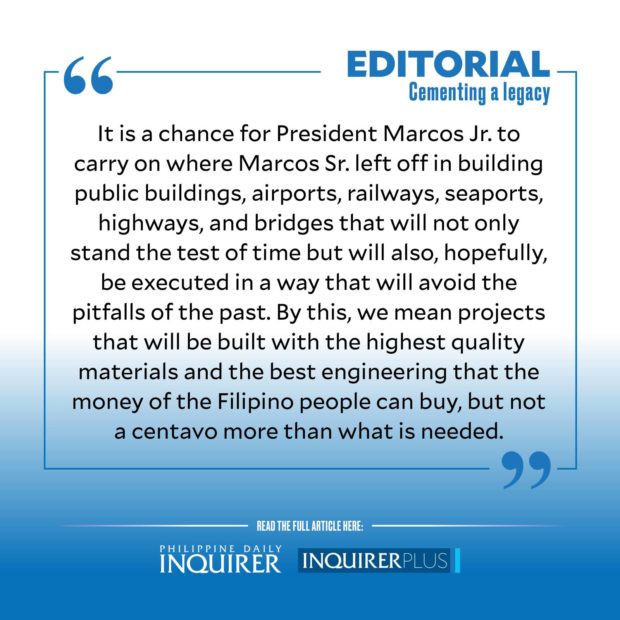Cementing a legacy
 Every presidential administration aims to have its own trademark infrastructure program, and for good reason.
Every presidential administration aims to have its own trademark infrastructure program, and for good reason.
As a means of revving up broad swathes of the economy, few undertakings can match the positive impact of large public works projects in terms of mobilizing investments, creating employment and, once completed, providing long-term benefits to citizens and the government alike.
Infrastructure also has the added benefit of serving as legacy projects by which current leaders are remembered—positively or negatively—long after they’ve left office.
Article continues after this advertisementThus, President Marcos Jr.’s move to forge ahead by breaking ground on the Metro Manila Subway Project that was started by his predecessor is a welcome move. Once completed in the final year of his administration, the 33-kilometer project will be able to move at least half a million passengers per day, cutting what is presently a 90-minute north-south commute in Metro Manila to less than half that, under ideal circumstances.
During its construction, thousands of jobs will be created, both directly and indirectly. Once it is completed, even more employment is expected to be generated by the foot traffic that will happen in and around the subway’s 17 stations.
But perhaps, most importantly, Filipino commuters, who currently see their productivity eroded by soul-sapping, daily, two-way travel, will find themselves with more energy to devote to work at the start of the day, and more enriching personal lives after.
Article continues after this advertisementThe same framework of benefits can be applied to all the other proposed infrastructure projects that are badly needed not only in Metro Manila, but in other urban cities around the country and, indeed, even in rural areas, too.
Better transportation systems are as badly needed in Matnog, as they are in Makati. A more modern airport is needed in Butuan, as it is in Bulacan. And more durable highways are as needed in Daraga, as they are in Davao.
And in the process of finding the wherewithal to build all these badly needed projects, the government should ditch the practice of its predecessor in favoring China as a source of funding and supplies and, instead, open itself up to whichever country, funder, supplier, or proponent—whether from the public or private sector—can deliver the best product to the Filipino people at the most cost-effective price.
What the Marcos Jr. administration must also avoid at all costs was the practice of the previous administration, when a sizable amount of resources meant for infrastructure ended up being spent on mostly useless and oftentimes inconvenient road reblocking projects all over the country. This effort saw perfectly good roads being torn up and repaved, all for the cynical excuse of creating temporary employment while simultaneously keeping political allies in local government units and their favored contractors happy.
Even though such a practice can be cynically said to create employment for jobless workers and help promote economic growth, the kind of spending the country needs is for the more lasting and more permanent kind of infrastructure.
The current environment presents a unique opportunity for Mr. Marcos to prove his critics and doubters wrong.
It is a chance for Mr. Marcos to carry on where Marcos Sr. left off in building public buildings, airports, railways, seaports, highways, and bridges that will not only stand the test of time but will also, hopefully, be executed in a way that will avoid the pitfalls of the past.
By this, we mean projects that will be built with the highest quality materials and the best engineering that the money of the Filipino people can buy, but not a centavo more than what is needed—centavos that, based on this country’s long experience over several administrations, tend to add up into billions of pesos of wasted taxpayer money.
To do all this, however, the Chief Executive must act fast. Infrastructure projects are notoriously slow undertakings, and six years tend to fly right by. He must task his economic managers (who have yet to lay out a clear direction for the country over three months into their jobs) with marshaling the government’s resources toward this effort, as well as getting out of the way of private sector firms whose activities are aligned with this goal.
If Mr. Marcos achieves this—if he manages to build and complete, at the right price, big-ticket infrastructure projects for the benefit of the Filipino people—not only will he finally fulfill the unkept promises of his recent predecessors, he will even exceed the achievements of his father in this regard and perhaps achieve his mission to redeem his family’s name.
















